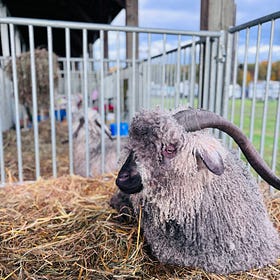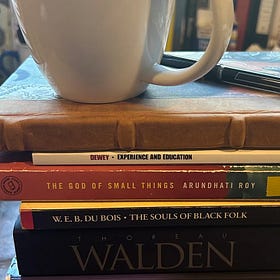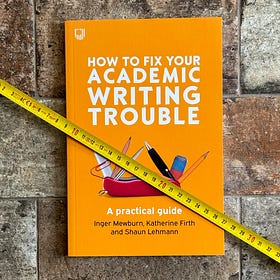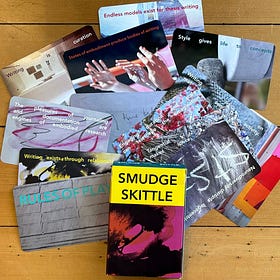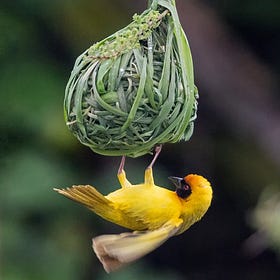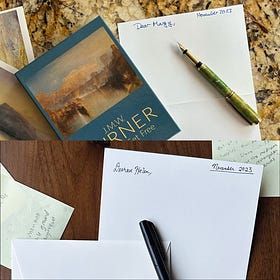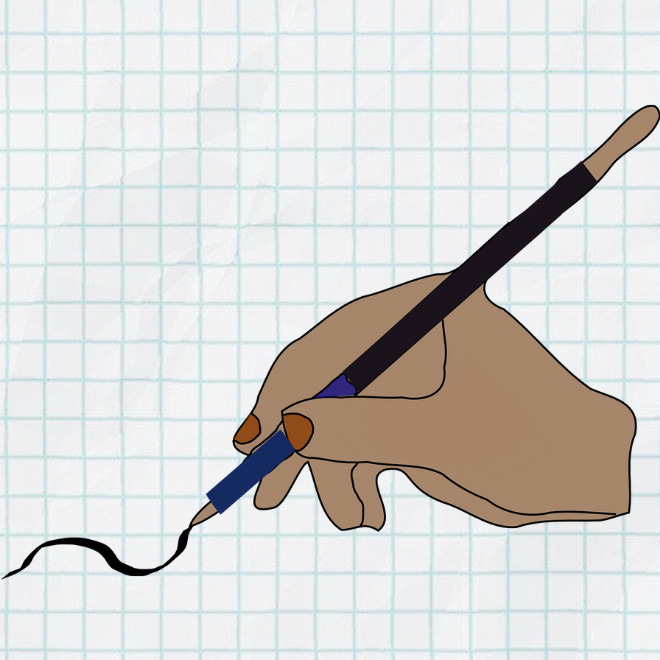30 Days of #AcWriMoments
Daily prompts for finding courage, clarity, and purpose in your scholarly work
Welcome to #AcWriMoments, an evergreen writing resource created by writing experts Margy Thomas (ScholarShape) and Helen Sword (WriteSPACE).
The 30 beautiful prompts in our 30 Days of #AcWriMoments series were contributed by writing scholars, coaches, consultants, and editors from around the world. (You can read all about them on our Meet the Contributors page).
For further resources to guide and inspire you in your scholarly life:
Check out the 12 monthly prompts of A Year of #AcWriMoments.
Subscribe to Helen and Margy’s new collaborative venture, !
Day 1: Share an #AcWriMoment
The great-great-grandparent of #AcWriMoments is Wordsworth’s concept of spots of time. In The Prelude, Wordsworth movingly describes these experiences as precious stretches of uncounted minutes when we sink into a sense of cohesion, even sublimity, and find pieces of encouragement or insight that enable us to return to the workaday world with the courage to carry on.
Day 2: Choose a name
Throughout my pregnancy, the central question swirling in my anxious thoughts wasn’t about health, money, or career. All of those would’ve made practical sense to worry about. But instead, what preoccupied me most was a narrative concern: What would be the baby’s name?
Day 3: Write like Freddie
I can’t seem to stop writing about my dog Freddie, a snow-white bichon frise with a sweet disposition and a jaunty tail. He features in my most recent book, on the front page of my website, and even on my company’s “our team” page, where his official job description is “Cuddles Manager.”
Day 4: Tell a story
Your story might be about an ethnographic encounter, an archival document, a text you’ve closely analyzed, or some other kind of data that you’ve gathered. Imagine you’re relating your story to someone who isn’t familiar with your research yet...
Day 5: Relieve loneliness through writing
One of my favorite quotations from C.S. Lewis is this one: “We read to know we’re not alone.” Here Lewis expresses an important truth: Reading connects us with others who either validate our own experiences or challenge them in ways that, at best, are life-transforming; at worst, make us ponder.
Day 6: Hook your reader
Imagine that the editor of your favorite newspaper, magazine, or blog hears about your academic work and invites you to contribute a piece for publication. It might be a short essay or a persuasive piece like an op-ed.
How would you begin that piece? What would draw the audience in and make them want to keep reading?
Day 7: Make every moment count
Every time I submit a piece of writing to an editor, I hear the same complaint: Your introduction takes too long to get to the point. Essays, chapter, books—they all display my love for long and leisurely invitations to readers.
Day 8: Trace a lineage
Where do ideas come from? How do they evolve? How does an idea pass from one mind to another and shape-shift as it goes? When an idea takes on solid form in the world, what’s worth remembering about the traces it bears of previous iterations?
Day 9: Write with your body
Breathe, dear writer. Take in a deep inhale. Exhale as slowly as possible. Do that again—inhale to fill up, exhale to slow down. Notice the parts of you necessary for breathing. Your nose, mouth, lungs, belly—your body.
Day 10: Go short, go long
Academic readers can find it hard to give good feedback on sentence length.
If you are getting it wrong, they will use feedback words that recall physical motions. Students who write too many short sentences will be accused of being “choppy.” On the other hand, if your sentences are too long, you might be told you are “rambling” or “wandering.”
Day 11: Let your words take flight
In our everyday language, we often use the idea of flying and flight as metaphor: time flies; she’s a high-flier. We are hard wired to the primal experience of fight or flight. To fly can mean to escape, to take flight from something; and it can also mean that we find our freedom, take off, launch something upon the air, soar through open spaces.
Day 12: Remember the clues from Younger You
What would Child Me do? For me, that’s one of the trustiest questions to ask myself anytime I feel truly stuck in work or in life. My Child Self knows what’s important.
Day 13: Create your writing alter-egos
Even the great Sir Paul McCartney struggled with creative block. Luckily for us, he applied his creative genius to solving this problem.
Day 14: Smudge your lines
In creativity research, the value of intuitive, playful, and unpredictable studio methods is well accepted. There are times when conventional approaches to writing and the values of proof, explanation, predictability, analysis, and linear argument may constrain, rather than enable, creative research.
Day 15: Linger over good writing
The starting point for becoming a good writer is to be a good reader. Writers acquire their technique by spotting, savoring, and reverse-engineering examples of good prose.
Day 16: Imagine your writing is worth the wait
Time as a circumstance has an outsized influence on our thoughts about our writing. In fact, academics risk becoming so preoccupied with thoughts about time that they lose sight of their real focus, which is the quality of their work.
Day 17: Pose questions to keep yourself curious
We all hit roadblocks in our writing when we are not feeling inspired or motivated to keep going. Consider drafting a set of questions for yourself that you can respond to in order to get your writing juices flowing again.
Day 18: Walk with poetry
I wrote these verses a few months ago when the hope of ending my decade-long limbo as a refugee ignited within me, with my sponsorship to New Zealand in progress.
Day 19: Find your happy penguins
What do penguins have to do with productive writing? Everything!
When we come to our writing in a positive frame of mind, we are likely to write more skilfully, creatively, and with greater enjoyment than when we arrive at our desk burdened by anxiety, anger, or doubt.
Day 20: Dialogue with a character
Think of a fictional character you know well. Tell that character about your work, or your problem, in your own written words. Then write down their reply, and continue to create a written dialogue between the two of you until it feels complete.
Day 21: Plan a journey
Many years ago, I was fortunate to take a playwriting class with a prolific and well-known British playwright. After reading the draft of my one-act play, he told me that it read as if I had set out to write Little Red Riding Hood, but the only thing I knew about my play was that it was about a girl in a red cape (!).
Day 22: Turn your self-judgments into writing mantras
When you sit down to write, does your mind bring up a stream of nasty, judgmental thoughts that stop you in your tracks? It happens to everyone! I’ve found that the best way to counter these self-judgments is to create positive associations with writing that help you feel good while you’re doing it.
Day 23: Spark a thank-you chain
As many of us learned in early childhood, saying “thank you” for a gesture we appreciate can be a simple yet powerful act of connection. Our thank-yous cement our bonds with one another, making explicit the positive effects we have on each other and expressing that we see each other and are seen in return.
Day 24: Trust when it's ok not to write
I’d just opened my laptop when my niece floated in and flopped down on the couch. She’d been sleeping in my office for a week, which meant I’d been working from my bedroom floor, hunched over my laptop.
Day 25: Receive the offering in front of you
Walking home from the grocery store the other day, I got caught in the rain. Thanks for nothing, weather app! As I trudged along in the downpour, exchanging sympathetic glances with cyclists and fellow pedestrians, my thoughts started churning.
Day 26: Write in color
Color helps us think, and color brings us joy. That’s a winning combination for any writer!
Day 27: Straighten your zigzags
You write the first sentence, then you pause, you read it, and you decide you don’t like it. So what do you do next? You delete it… and start again. And again. Does it sound familiar?
Day 28: Write what you're avoiding
Is there something you are avoiding writing? Maybe it seems a bit “out there” or “weird”? When you tell yourself that your research is weird, you don’t give it the time, energy, and respect it deserves.
Day 29: Do what no one has to tell you to do
Are you doing your dream job? Some of us are. Some of us aren’t. But what if you could find a way to infuse the one thing that “no one EVER has to tell you to do” into the job you’re doing now?
Day 30: Plan(t) an #AcWriMoment
What unique perspectives, experiences, constellations of values, and capacity for pleasure and joy define who you are as a scholar and as a participant in the larger scholarly enterprise?
Thank you for being part of #AcWriMoments! To help others discover this resource, please forward this message to friends and colleagues — and if you’re reading this on Substack, would you drop us a heart and a restack too? We’re so grateful to have you here! 🙏
and













